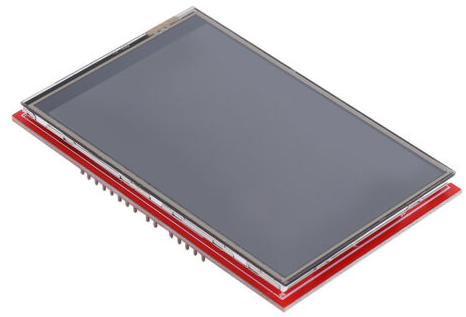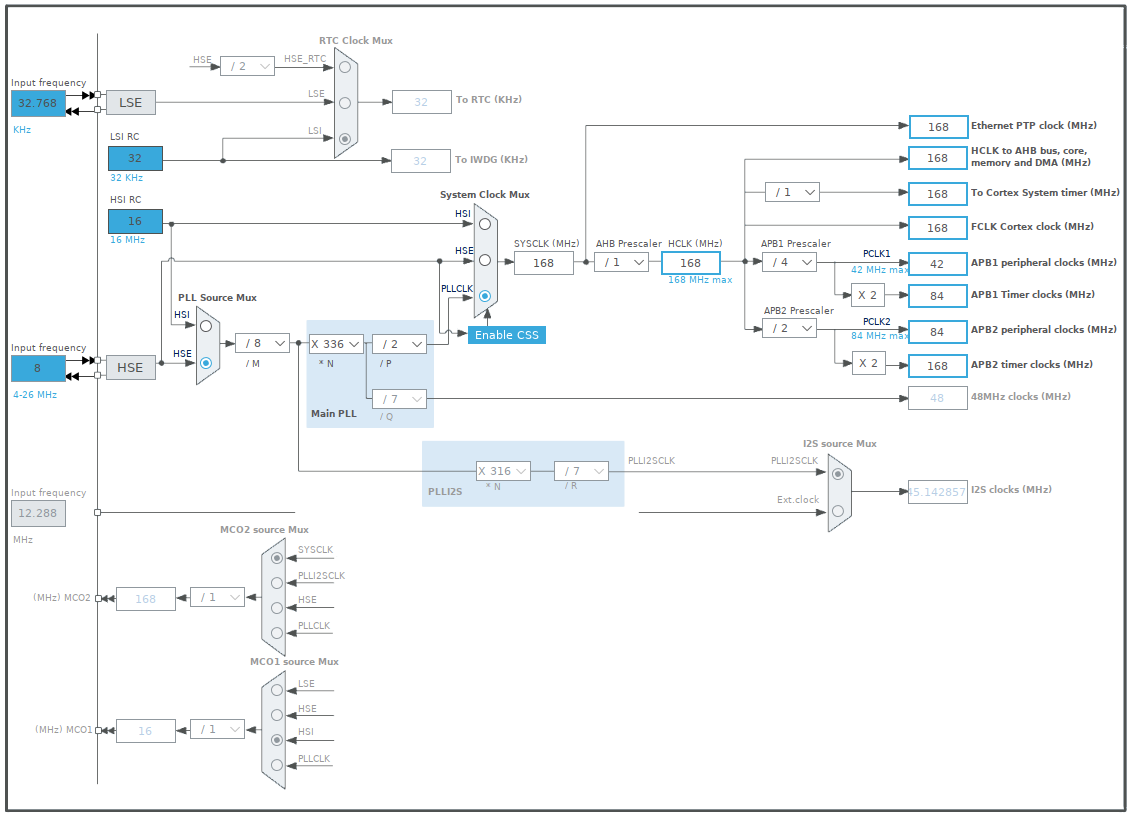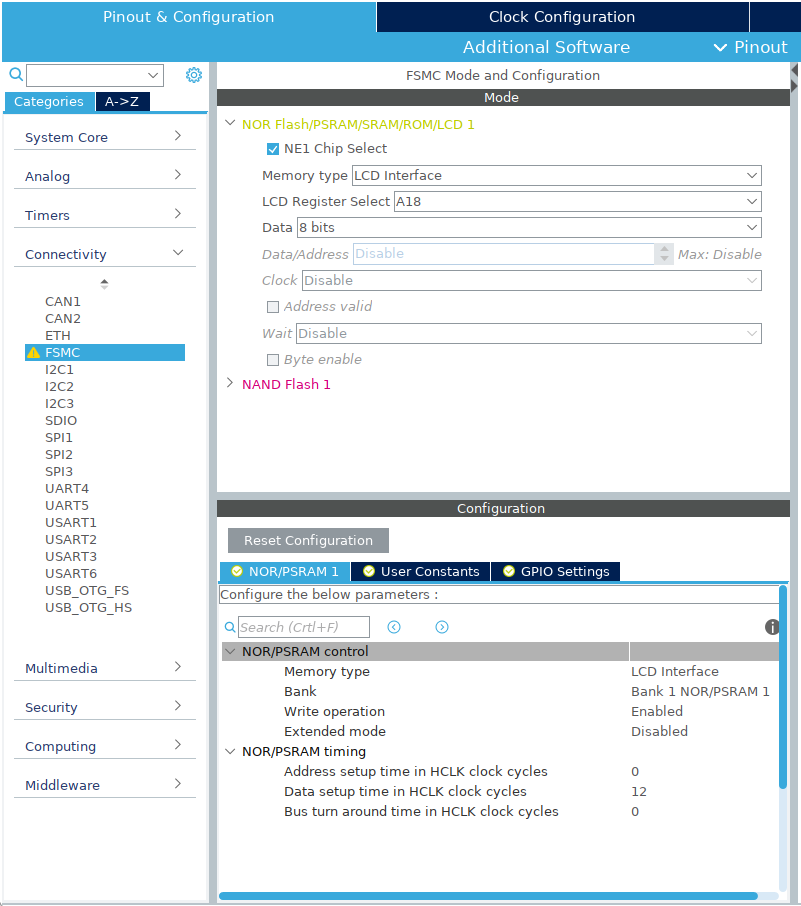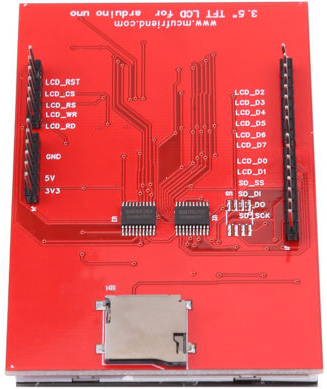3.5" inch TFT LCD Display Module 480X320 driven with FSMC.
TFT LCD Display Module 480X320 driven with FSMC
I have recently bought a 3.5" inch TFT LCD Touch Screen Display Module 480X320 with a www.mcufriend.com label on the back side. The display was equipped with an 8bit parallel interface. First I decided to test it with the UniGraphic library using the BUS_8 protocol. The display was very slow but improved when I switched to the PAR_8 protocol. Because I heard about the possibility to use a Flexible Static Memory Controller (FSMC), built into some STM MCU's, to drive LCD's (read/write to LCD's memory rather than to an external SRAM) I thought it would be a fun to try it out.

Below is the brief story of what I did:
- Created a project for my STM32F407VE board in the STM32CubeIDE
- Set the
Clock Configurationto match the one used by Mbed for the Seeed Arch Max board:
- Selected
FSMCin theConnectivitycategory and configured it as below:
- Let the
STM32CubeIDEgenerate the code (files). - Created a new program for the Seeed Arch Max target in the Mbed Online Compiler by selecting a
mbed os blinkytemplate. - Replaced the
main.cppwith themain.ccontent of theSTM32CubeIDEproject. Copy & Pastedthe other files with codes from theSTM32CubeIDEproject to the online compiler project.- Renamed and modified:
"stm32f4xx_it.h" to "stm32f4xx_it_msp.h"
"stm32f4xx_it.c" to "stm32f4xx_it_msp.c" - Added the UniGraphic library to the online compiler project.
- Extended the
UniGraphiclibrary with aFSMC_8protocol and replaced theTFT::set_orientation(int orient)function with the one used bymcufriendfor arduino. - Modified the
main.cppas needed.
 |  |
Wiring
| STM32F407VE | TFT LCD module |
|---|---|
| +3.3V | 3V3 |
| GND | GND |
| PB_12 | LCD_RST |
| GND | LCD_CS |
| PD_13 (RS) | LCD_RS |
| PD_5 (WR) | LCD_WR |
| PD_4 (RD) | LCD_RD |
| PD_14 (DB00) | LCD_D0 |
| PD_15 (DB01) | LCD_D1 |
| PD_0 (DB02) | LCD_D2 |
| PD_1 (DB03) | LCD_D3 |
| PE_7 (DB04) | LCD_D4 |
| PE_8 (DB05) | LCD_D5 |
| PE_9 (DB06) | LCD_D6 |
| PE_10 (DB07) | LCD_D7 |
Results
| Execution times | ||
|---|---|---|
| Used protocol | BUS_8 | FSMC_8 |
| Operation \ Time | ms | ms |
| Clear | 2283.980 | 38.454 |
| Plot | 192.066 | 11.365 |
| 8bit BMP | 63.805 | 41.338 |
| Large Font | 163.872 | 7.895 |
| Sparce pixels | 2072.265/1458.051 | 74.107/52.168 |
| 16bit BMP | 2288.589 | 59.904 |
UniGraphic/Protocols/FSMC8.cpp
- Committer:
- hudakz
- Date:
- 2020-09-25
- Revision:
- 1:47c996032a9e
- Parent:
- 0:fa952828e34c
File content as of revision 1:47c996032a9e:
#include "FSMC8.h"
#include "stdint.h"
// Addres bit A18 is used to select LCD's REGISTER or RAM: A18 = 0b00000000000001000000000000000000 = 0x00040000
volatile unsigned char* lcd_reg = (unsigned char*)0x60000000; // FSMC BANK1, A18 = 0 -> write to LCD's REGISTER
volatile unsigned char* lcd_ram = (unsigned char*)0x60040000; // FSMC BANK1, A18 = 1 -> read/write to LCD's RAM
/**
* @brief
* @note
* @param
* @retval
*/
FSMC8::FSMC8(PinName reset) :
_reset(reset)
{
_reset = 1;
}
/**
* @brief
* @note
* @param
* @retval
*/
void FSMC8::wr_cmd8(unsigned char cmd)
{
lcd_reg[0] = cmd; // Write to LCD's register
}
/**
* @brief
* @note
* @param
* @retval
*/
void FSMC8::wr_data8(unsigned char data)
{
lcd_ram[0] = data; // Write to LCD's RAM
}
/**
* @brief
* @note
* @param
* @retval
*/
void FSMC8::wr_cmd16(unsigned short cmd)
{
wr_cmd8(cmd >> 8); // Write MSB to LCD's register
wr_cmd8(cmd & 0xFF); // Write LSB to LCD's register
}
/**
* @brief
* @note
* @param
* @retval
*/
void FSMC8::wr_data16(unsigned short data)
{
wr_data8(data >> 8); // Write MSB to LCD's RAM
wr_data8(data & 0xFF); // Write LSB to LCD's RAM
}
/**
* @brief
* @note
* @param
* @retval
*/
void FSMC8::wr_gram(unsigned short data)
{
wr_data16(data);
}
/**
* @brief
* @note
* @param
* @retval
*/
void FSMC8::wr_gram(unsigned short data, unsigned int count)
{
if ((data >> 8) == (data & 0xFF)) {
count <<= 1;
while (count) {
wr_data8(data);
count--;
}
}
else {
while (count) {
wr_data16(data);
count--;
}
}
}
/**
* @brief
* @note
* @param
* @retval
*/
void FSMC8::wr_grambuf(unsigned short* data, unsigned int lenght)
{
while (lenght) {
wr_data16(*data++);
lenght--;
}
}
/**
* @brief
* @note
* @param
* @retval
*/
unsigned char FSMC8::rd_data8(unsigned int i /* = 0 */)
{
return lcd_ram[i]; // Read from LCD's RAM
}
/**
* @brief
* @note
* @param
* @retval
*/
unsigned short FSMC8::rd_gram(bool convert)
{
unsigned int r = 0;
rd_data8(); // dummy read
r |= rd_data8();
r <<= 8;
r |= rd_data8();
if (convert) {
r <<= 8;
r |= rd_data8();
// gram is 18bit/pixel, if you set 16bit/pixel (cmd 3A), during writing the 16bits are expanded to 18bit
// during reading, you read the raw 18bit gram
r = RGB24to16((r & 0xFF0000) >> 16, (r & 0xFF00) >> 8, r & 0xFF); // 18bit pixel padded to 24bits, rrrrrr00_gggggg00_bbbbbb00, converted to 16bit
}
// _bus.output();
return (unsigned short)r;
}
/**
* @brief
* @note
* @param
* @retval
*/
unsigned int FSMC8::rd_reg_data32(unsigned char reg)
{
unsigned char data[4] = { 0 };
unsigned int* r = (unsigned int*)&data[0];
wr_cmd8(reg);
data[3] = rd_data8(0);
data[2] = rd_data8(0);
data[1] = rd_data8(0);
data[0] = rd_data8(0);
return *r;
}
// in Par mode EXTC regs (0xB0-0xFF) can be directly read
unsigned int FSMC8::rd_extcreg_data32(unsigned char reg, unsigned char SPIreadenablecmd)
{
return rd_reg_data32(reg);
}
// ILI932x specific
void FSMC8::dummyread()
{
rd_data8(); // dummy read
}
// ILI932x specific
void FSMC8::reg_select(unsigned char reg, bool forread)
{
wr_cmd8(0); // write MSB
wr_cmd8(reg); // write LSB
}
// ILI932x specific
void FSMC8::reg_write(unsigned char reg, unsigned short data)
{
wr_cmd8(0); // write MSB
wr_cmd8(reg); // write LSB
wr_data16(data);
}
// ILI932x specific
unsigned short FSMC8::reg_read(unsigned char reg)
{
unsigned short r = 0;
wr_cmd8(0);
wr_cmd8(reg);
r |= rd_data8() & 0xFF;
r <<= 8;
r |= rd_data8() & 0xFF;
return r;
}
/**
* @brief
* @note
* @param
* @retval
*/
void FSMC8::hw_reset()
{
_reset = 1;
wait_ms(15);
_reset = 0; // display reset
wait_ms(2);
_reset = 1; // end reset
wait_ms(100);
}